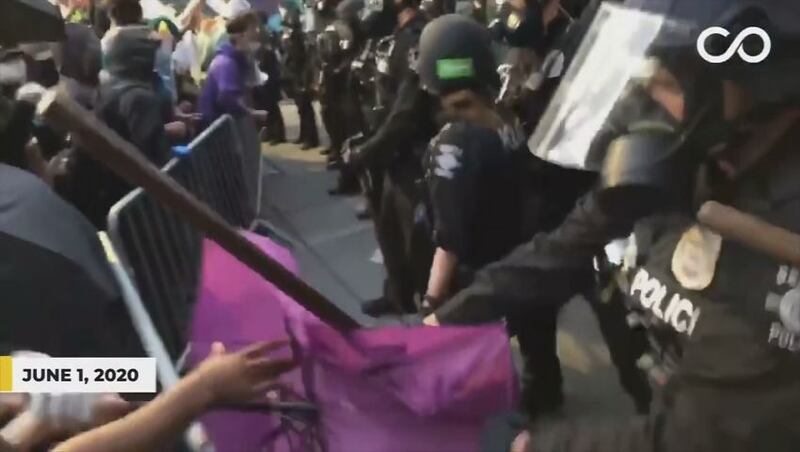SEATTLE — The Seattle Police Department announced consequences Wednesday for an SPD assistant chief who led the response on Capitol Hill last summer, which ended with officers deploying pepper spray, blast balls and tear gas on protestors. It was a use of force that the Office of Police Accountability (OPA) found to violate policy.
Assistant Chief Steve Hirjack has now been demoted to being a captain for his role in leading the incident response during the protests.
“I must have confidence that each and every member of this department’s sworn Command Staff, regardless of bureau assignment, be able to step into an incident command position as circumstances may require. This demotion is a reflection of my lack of confidence in this individual’s ability to do so,” said Chief Adrian Diaz, in a letter to Seattle City Council.
Diaz didn’t name Hirjak in the letter, but SPD confirmed his identity later on Wednesday.
Omari Salisbury, founder of Converge Media, took video of the flash point at 11th Ave and E. Pine that was critical to the investigation by the OPA.
Seattle I have a question for @SeattlePD @SeattleOPA @MayorJenny @SeattleCouncil @SeaCPC - Are you seriously saying that no one is responsible for tear-gassing a whole neighborhood? Asking on behalf of media, peaceful protesters, and residents of Cap Hill all who got gassed. pic.twitter.com/rvXhHmEpfs
— Omari Salisbury (@Omarisal) May 13, 2021
An officer seizing the pink umbrella a protestor was holding launched the beginning of a wave of crowd dispersal measures.
“That day, June 1, the pink umbrella day - it turned the tide of protests here in Seattle,” Salisbury said. The original video has millions of views.
OPA analyzed video from June 1 and described the crowd as “agitated but not openly violent.” Many at the front of the crowd held open umbrellas.
“OPA does not find that seizure of the umbrella was, in and of itself, improper,” the report said. The umbrella was “within inches from officers” and the person holding it put it back in an officer’s face after he pushed it away.
However, the OPA found the use of force that happened next – and the use of crowd dispersal measures – to violate policy.
The OPA report said there was “no such substantial risk” of “acts that would cause injury or property destruction” to justify dispersing the crowd in that manner.
Two weeks ago, Chief Diaz announced he would not discipline the officer who was actually giving orders directly to the line of officers out of “fundamental fairness” because of “circumstances that were created at a higher level of command” and that officer was “carrying out decisions made at a higher rank.”
In the letter Wednesday, Diaz said, “We owe it to both the community and to our officers” to “identify and address root causes of outcomes that we all can acknowledge were problematic” – which is why he removed Hirjack as Assistant Chief and returned him to the Captain rank.
Salisbury is questioning whether the consequences are enough.
“I would say it’s a step forward,” Salisbury said. “I definitely don’t think that was in proportion and considering the consequences of it,” he said.
He points out, prior to the murder of George Floyd, some city council members campaigned on bringing more officers to the force.
But he says after SPD’s response to the initial protests, the police department fell out of favor.
“Public sentiment really changed against the SPD when the citizen stakeholders of Seattle saw extreme police violence used against the citizens,” Salisbury said.
“So you tell me - a demotion from assistant or deputy chief to captain, for such a consequential action that impacted our whole city,” Salisbury said. “Is Chief Diaz doing enough?”
In the letter, Diaz said the moves he made were according to Seattle Municipal Code 4.08.060 (2)(a), which says, “Above the rank and position of Police Captain in the Police Department… in the event of removal, have the right to resume the rank and position from which he or she was so assigned.”
©2021 Cox Media Group








